#predation
Text
@thrones-of-buer submitted: 😳😳😳 smooching

Not sure this smooch is going well for the superworm :\
#animals#submission#myriapods#centipede#Vietnamese centipede#scolopendra dehaani#superworm#zophobas morio#scolopendra#predation#bug death
75 notes
·
View notes
Text

Wasp with a paralyzed caterpillar
By: A. Blank
From: Wild, Wild World of Animals: Insects & Spiders
1977
#predation#wasp#hymenopteran#insect#arthropod#invertebrate#1977#1970s#A. Blank#Wild Wild World of Animals
53 notes
·
View notes
Video
Very impressed with this clever grackle snatching a minnow right out of the creek. Watching birds hunt always makes me feel like an early cretaceous naturalist observing a Utahraptor outsmart its prey.
8K notes
·
View notes
Text
Sympathy for the spammer

Catch me in Miami! I'll be at Books and Books in Coral Gables on Jan 22 at 8PM.

In any scam, any con, any hustle, the big winners are the people who supply the scammers – not the scammers themselves. The kids selling dope on the corner are making less than minimum wage, while the respectable crime-bosses who own the labs clean up. Desperate "retail investors" who buy shitcoins from Superbowl ads get skinned, while the MBA bros who issue the coins make millions (in real dollars, not crypto).
It's ever been thus. The California gold rush was a con, and nearly everyone who went west went broke. Famously, the only reliable way to cash out on the gold rush was to sell "picks and shovels" to the credulous, doomed and desperate. That's how Leland Stanford made his fortune, which he funneled into eugenics programs (and founding a university):
https://www.hachettebookgroup.com/titles/malcolm-harris/palo-alto/9780316592031/
That means that the people who try to con you are almost always getting conned themselves. Think of Multi-Level Marketing (MLM) scams. My forthcoming novel The Bezzle opens with a baroque and improbable fast-food Ponzi in the town of Avalon on the island of Catalina, founded by the chicle monopolist William Wrigley Jr:
http://thebezzle.org
Wrigley found fast food declasse and banned it from the island, a rule that persists to this day. In The Bezzle, the forensic detective Martin Hench uncovers The Fry Guys, an MLM that flash-freezes contraband burgers and fries smuggled on-island from the mainland and sells them to islanders though an "affiliate marketing" scheme that is really about recruiting other affiliate markets to sell under you. As with every MLM, the value of the burgers and fries sold is dwarfed by the gigantic edifice of finance fraud built around it, with "points" being bought and sold for real cash, which is snaffled up and sucked out of the island by a greedy mainlander who is behind the scheme.
A "bezzle" is John Kenneth Galbraith's term for "the magic interval when a confidence trickster knows he has the money he has appropriated but the victim does not yet understand that he has lost it." In every scam, there's a period where everyone feels richer – but only the scammers are actually cleaning up. The wealth of the marks is illusory, but the longer the scammer can preserve the illusion, the more real money the marks will pump into the system.
MLMs are particularly ugly, because they target people who are shut out of economic opportunity – women, people of color, working people. These people necessarily rely on social ties for survival, looking after each others' kids, loaning each other money they can't afford, sharing what little they have when others have nothing.
It's this social cohesion that MLMs weaponize. Crypto "entrepreneurs" are encouraged to suck in their friends and family by telling them that they're "building Black wealth." Working women are exhorted to suck in their bffs by appealing to their sisterhood and the chance for "women to lift each other up."
The "sales people" trying to get you to buy crypto or leggings or supplements are engaged in predatory conduct that will make you financially and socially worse off, wrecking their communities' finances and shattering the mutual aid survival networks they rely on. But they're not getting rich on this – they're also being scammed:
https://papers.ssrn.com/sol3/papers.cfm?abstract_id=4686468
This really hit home for me in the mid-2000s, when I was still editing Boing Boing. We had a submission form where our readers could submit links for us to look at for inclusion on the blog, and it was overwhelmed by spam. We'd add all kinds of antispam to it, and still, we'd get floods of hundreds or even thousands of spam submissions to it.
One night, I was lying in my bed in London and watching these spams roll in. They were all for small businesses in the rustbelt, handyman services, lawn-care, odd jobs, that kind of thing. They were 10 million miles from the kind of thing we'd ever post about on Boing Boing. They were coming in so thickly that I literally couldn't finish downloading my email – the POP session was dropping before I could get all the mail in the spool. I had to ssh into my mail server and delete them by hand. It was maddening.
Frustrated and furious, I started calling the phone numbers associated with these small businesses, demanding an explanation. I assumed that they'd hired some kind of sleazy marketing service and I wanted to know who it was so I could give them a piece of my mind.
But what I discovered when I got through was much weirder. These people had all been laid off from factories that were shuttering due to globalization. As part of their termination packages, their bosses had offered them "retraining" via "courses" in founding their own businesses.
The "courses" were the precursors to the current era's rise-and-grind hustle-culture scams (again, the only people getting rich from that stuff are the people selling the courses – the "students" finish the course poorer). They promised these laid-off workers, who'd given their lives to their former employers before being discarded, that they just needed to pull themselves up by their own boostraps:
https://pluralistic.net/2023/04/10/declaration-of-interdependence/#solidarity-forever
After all, we had the internet now! There were so many new opportunities to be your own boss! The course came with a dreadful build-your-own-website service, complete with an overpriced domain sales portal, and a single form for submitting your new business to "thousands of search engines."
This was nearly 20 years ago, but even then, there was really only one search engine that mattered: Google. The "thousands of search engines" the scammers promised to submit these desperate peoples' websites to were just submission forms for directories, indexes, blogs, and mailing lists. The number of directories, indexes, blogs and mailing lists that would publish their submissions was either "zero" or "nearly zero." There was certainly no possibility that anyone at Boing Boing would ever press the wrong key and accidentally write a 500-word blog post about a leaf-raking service in a collapsing deindustrialized exurb in Kentucky or Ohio.
The people who were drowning me in spam weren't the scammers – they were the scammees.
But that's only half the story. Years later, I discovered how our submission form was getting included in this get-rich-quick's mass-submission system. It was a MLM! Coders in the former Soviet Union were getting work via darknet websites that promised them relative pittances for every submission form they reverse-engineered and submitted. The smart coders didn't crack the forms directly – they recruited other, less business-savvy coders to do that for them, and then often as not, ripped them off.
The scam economy runs on this kind of indirection, where scammees are turned into scammers, who flood useful and productive and nice spaces with useless dross that doesn't even make them any money. Take the submission queue at Clarkesworld, the great online science fiction magazine, which famously had to close after it was flooded with thousands of junk submission "written" by LLMs:
https://www.npr.org/2023/02/24/1159286436/ai-chatbot-chatgpt-magazine-clarkesworld-artificial-intelligence
There was a zero percent chance that Neil Clarke would accidentally accept one of these submissions. They were uniformly terrible. The people submitting these "stories" weren't frustrated sf writers who'd discovered a "life hack" that let them turn out more brilliant prose at scale.
They were scammers who'd been scammed into thinking that AIs were the key to a life of passive income, a 4-Hour Work-Week powered by an AI-based self-licking ice-cream cone:
https://pod.link/1651876897/episode/995c8a778ede17d2d7cff393e5203157
This is absolutely classic passive-income brainworms thinking. "I have a bot that can turn out plausible sentences. I will locate places where sentences can be exchanged for money, aim my bot at it, sit back, and count my winnings." It's MBA logic on meth: find a thing people pay for, then, without bothering to understand why they pay for that thing, find a way to generate something like it at scale and bombard them with it.
Con artists start by conning themselves, with the idea that "you can't con an honest man." But the factor that predicts whether someone is connable isn't their honesty – it's their desperation. The kid selling drugs on the corner, the mom desperately DMing her high-school friends to sell them leggings, the cousin who insists that you get in on their shitcoin – they're all doing it because the system is rigged against them, and getting worse every day.
These people reason – correctly – that all the people getting really rich are scamming. If Amazon can make $38b/year selling "ads" that push worse products that cost more to the top of their search results, why should the mere fact that an "opportunity" is obviously predatory and fraudulent disqualify it?
https://pluralistic.net/2023/11/29/aethelred-the-unready/#not-one-penny-for-tribute
The quest for passive income is really the quest for a "greater fool," the economist's term for the person who relieves you of the useless crap you just overpaid for. It rots the mind, atomizes communities, shatters solidarity and breeds cynicism:
https://pluralistic.net/2023/02/24/passive-income/#swiss-cheese-security
The rise and rise of botshit cannot be separated from this phenomenon. The botshit in our search-results, our social media feeds, and our in-boxes isn't making money for the enshittifiers who send it – rather, they are being hustled by someone who's selling them the "picks and shovels" for the AI gold rush:
https://www.theguardian.com/commentisfree/2024/jan/03/botshit-generative-ai-imminent-threat-democracy
That's the true cost of all the automation-driven unemployment criti-hype: while we're nowhere near a place where bots can steal your job, we're certainly at the point where your boss can be suckered into firing you and replacing you with a bot that fails at doing your job:
https://pluralistic.net/2024/01/11/robots-stole-my-jerb/#computer-says-no
The manic "entrepreneurs" who've been stampeded into panic by the (correct) perception that the economy is a game of musical chairs where the number of chairs is decreasing at breakneck speed are easy marks for the Leland Stanfords of AI, who are creating generational wealth for themselves by promising that their bots will automate away all the tedious work that goes into creating value. Expect a lot more Amazon Marketplace products called "I'm sorry, I cannot fulfil this request as it goes against OpenAI use policy":
https://www.theverge.com/2024/1/12/24036156/openai-policy-amazon-ai-listings
No one's going to buy these products, but the AI picks-and-shovels people will still reap a fortune from the attempt. And because history repeats itself, these newly minted billionaires are continuing Leland Stanford's love affair with eugenics:
https://www.truthdig.com/dig-series/eugenics/
The fact that AI spam doesn't pay is important to the fortunes of AI companies. Most high-value AI applications are very risk-intolerant (self-driving cars, radiology analysis, etc). An AI tool might help a human perform these tasks more accurately – by warning them of things that they've missed – but that's not how AI will turn a profit. There's no market for AI that makes your workers cost more but makes them better at their jobs:
https://locusmag.com/2023/12/commentary-cory-doctorow-what-kind-of-bubble-is-ai/
Plenty of people think that spam might be the elusive high-value, low-risk AI application. But that's just not true. The point of AI spam is to get clicks from people who are looking for better content. It's SEO. No one reads 2000 words of algorithm-pleasing LLM garbage over an omelette recipe and then subscribes to that site's feed.
And the omelette recipe generates pennies for the spammer that posted it. They are doing massive volume in order to make those pennies into dollars. You don't make money by posting one spam. If every spammer had to pay the actual recovery costs (energy, chillers, capital amortization, wages) for their query, every AI spam would lose (lots of) money.
Hustle culture and passive income are about turning other peoples' dollars into your dimes. It is a negative-sum activity, a net drain on society. Behind every seemingly successful "passive income" is a con artist who's getting rich by promising – but not delivering – that elusive passive income, and then blaming the victims for not hustling hard enough:
https://www.ftc.gov/business-guidance/blog/2023/12/blueprint-trouble

I'm Kickstarting the audiobook for The Bezzle, the sequel to Red Team Blues, narrated by @wilwheaton! You can pre-order the audiobook and ebook, DRM free, as well as the hardcover, signed or unsigned. There's also bundles with Red Team Blues in ebook, audio or paperback.

If you'd like an essay-formatted version of this post to read or share, here's a link to it on pluralistic.net, my surveillance-free, ad-free, tracker-free blog:
https://pluralistic.net/2024/01/15/passive-income-brainworms/#four-hour-work-week

Image:
Cryteria (modified)
https://commons.wikimedia.org/wiki/File:HAL9000.svg
CC BY 3.0
https://creativecommons.org/licenses/by/3.0/deed.en
#pluralistic#late-stage capitalism#end-stage capitalism#feudalism#rentierism#blueprint for wealth#predation#clarkesworld#kindle#kindle unlimited program#kup#pyramid schemes#mlms#multilevel marketing#amway#spam#form spam#enshittification#ai#llms#large language models#chatbots#ucm#seo#search engine optimization#dark seo#passive income#passive income brainworms
820 notes
·
View notes
Text

Barn owl attacking a rat. Indian ink, watercolor, and body color on handmade cartridge paper. 8½" x 10".
Drawing Birds. Written and illustrated by Maurice Wilson. Published in 1965.
Internet Archive
482 notes
·
View notes
Text
I often talk about Alfonso as though he is a delicate gentleman and harmless little skittery thing, but that’s from the relaxed perspective of a much larger animal.
to crickets and cockroaches, he is still a deadly predator that strikes out of nowhere. his antenniform legs give him an incredibly acute sense of smell—the cricket had only been in the enclosure seconds before Alfonso roused himself from sleep and started to seek it out. and note that he always stays out of range of the cricket’s antennae, never letting it notice him even as he tracks its every movement.
541 notes
·
View notes
Text
Guys I feel like a mighty god just accepted a sacrifice from me 🛐
#not eli's art#not fandom#video#original video#no sound#animals#invertebrates#invertebrate#insects#insect#bugs#bug#bugblr#mantids#praying mantis#mantis#mealworms#predation#i feel honored#not kuro#not yoi
432 notes
·
View notes
Text
snake v bird makes for some of the sickest photos


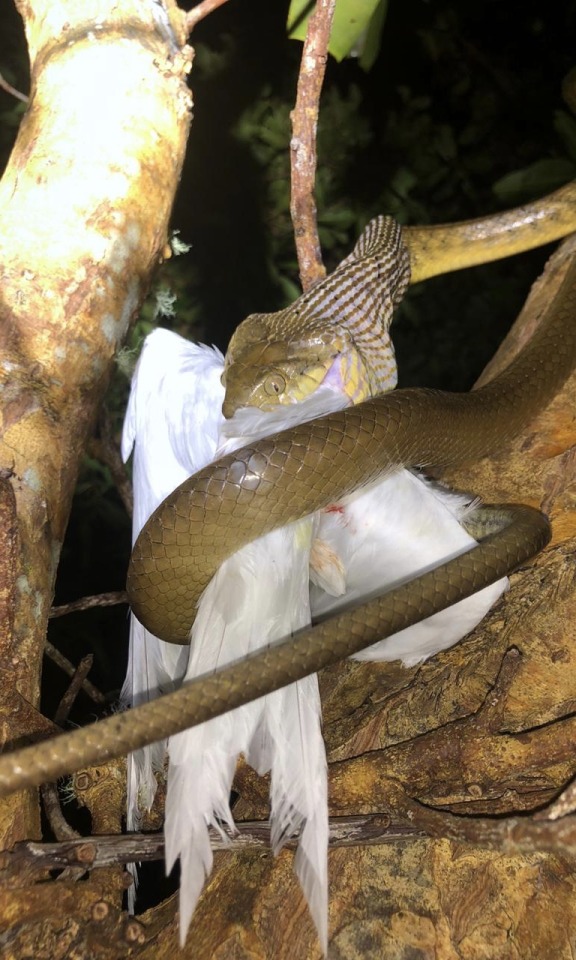
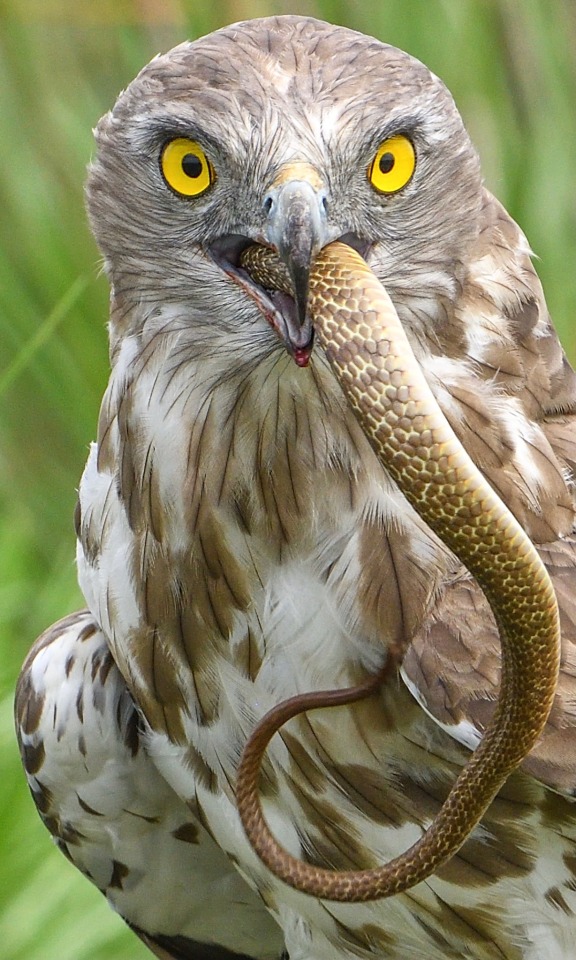
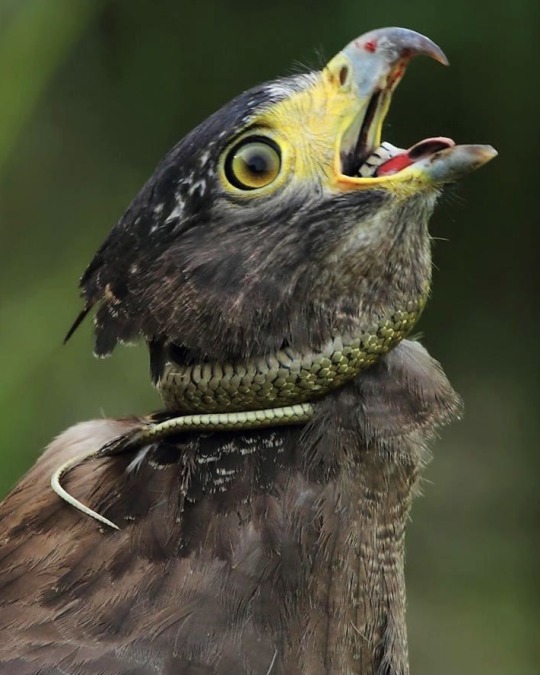
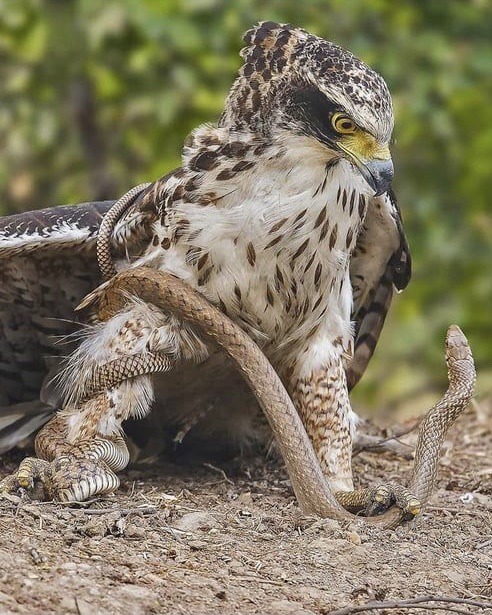
#those electric guitar noises henry makes on lpotl#love even matchups in nature#animal death#predation#birds#snakes#constriction#serpentine#fave pics#animals
717 notes
·
View notes
Text

After successfully hunting a Bearded seal (Erignathus barbatus), a Polar bear (Ursus maritimus) starts feeding on his prey. He enjoys his meal on an ice floe north of Svalbard, Norway.
229 notes
·
View notes
Text

dragon hunter, 6.10.22
#i took another photo of a crab spider obliterating prey larger than itself today and realized i never posted this one .#even though it fucks#so here you go <3#photography#bugs#goldenrod crab spider#dragonfly#bug death#insect death#predation#insect photography#nature photography#red clover#spider#spiders#spider photography#vermont#arachnids
244 notes
·
View notes
Photo




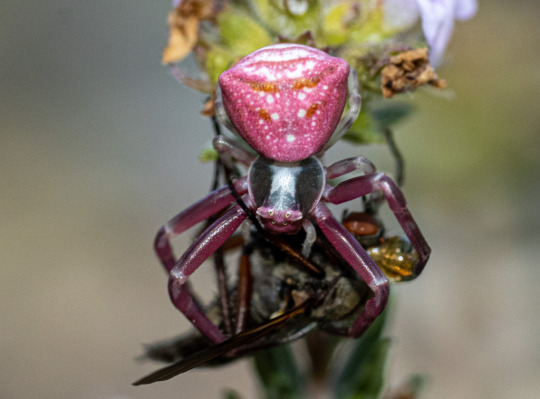





Pink crab spider, Thomisus onustus, Thomisidae
Despite the common name, this species exhibits a wide range of coloration including pink, white, yellow, green, brown, or a combination of any of those. Like other flower crab spiders, they are able to change their color over a matter of days to more closely match their environment. Found in Eurasia and northern Africa.
Photo 1 by paulf84, 2 by wildchroma, 3 by sonic7730, 4 by ffigon, 5 by marie-ruel, 6 by marketaz, 7 by dbenvenuti, 8 by mammal, 9 by alexis_orion, and 10 by talgar-t64
#animals#curators on tumblr#bugs#arachnids#insects#spider#crab spider#pink crab spider#bee#bug death#predation#one nice bug#camouflage
5K notes
·
View notes
Text

Brown bears eating salmon
By: Tee Balog & Fritz Goro
From: Alaska
1972
1K notes
·
View notes
Note
is the horses eat birds thing true? What are other weird things about horses we don’t know every fact I learn about them is weird
Like many other herbivores, horses are not as strict about the “only plants” thing as you might think. Though it’s exceedingly rare (but not unheard of) for horses to purposefully hunt and kill birds, they’re not above opportunistically munching on a little bird here and there if it gets in the way of grazing. Calories are calories!
There are so many weird things about horses. My favorites are going to be related to anatomy and physiology because equine medicine is crazy. Here are my top picks
- Horses (like rabbits) are obligate nasal breathers and cannot breathe through their mouth. This means a super congested nose can kill them, and nasal surgery on horses is really scary because post op swelling can become fatal if you’re not careful
- Horses have a callus thing about halfway up the leg called a chestnut or night eye (everything in horse anatomy has several weird names like that). This callus is believed to be a vestigial toe
-Horses have a structure called the guttural pouch that is basically paired sacs of air nestled inside the head likely to help with thermoregulation. Only problem is that pretty much every vital structure in the head (veins, arteries, nerves) pass through these sacs, so if something like a fungal infection gets in there it can cause huge problems very quickly
- Every vet student hates the word laminitis. This is a condition involving inflammation of the inner parts of the hoof and if it gets bad enough the hoof actually starts to detach from the bone. Laminitis can be caused by everything from retained placenta to eating particularly lush grass. That’s right- if you allow your horse to feast on a pasture too green, it’s feet might start falling apart 🙃
Despite their rep as horribly designed animals I actually love horses and find their physiology fascinating. Any animal that has evolved to do one specific thing really, really well (in their case running) will have some little quirks of their biology as a result.
862 notes
·
View notes
Text
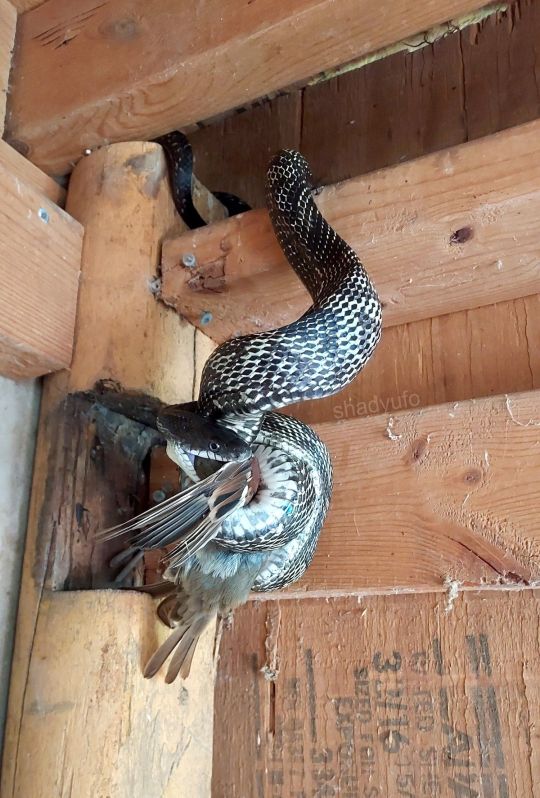
Gray rat snake having a house sparrow for lunch.
#snake#snakes#rat snake#reptiles#wildlife#dead animal#predation#gray rat snake#Pantherophis spiloides
235 notes
·
View notes
Text



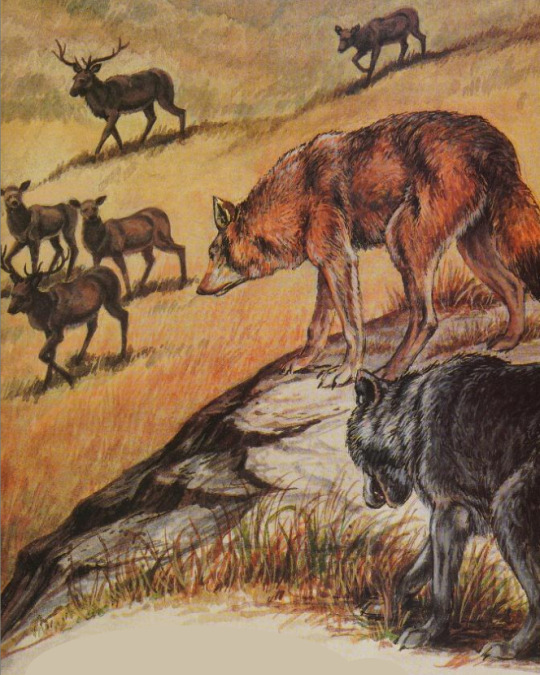





Wonderful Wolves of the Wild. Written by Arlene Erlbach. Illustrated by Jim Kersell. 1996.
Internet Archive
1K notes
·
View notes
Text
Élise also had a meal today. crunchy
790 notes
·
View notes